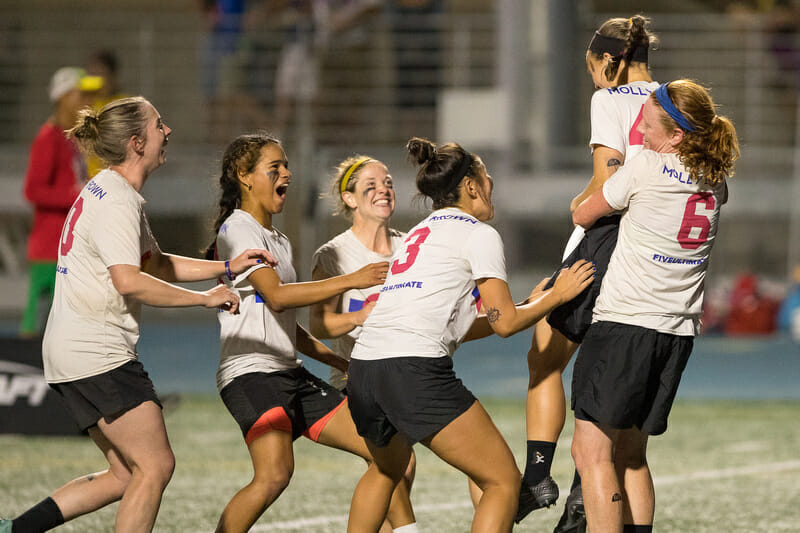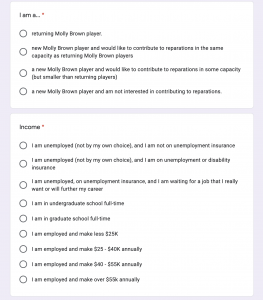Money that would have gone toward a typical summer of club ultimate was distributed to the Colorado community as part of the team's 2020 focus on organizing, activism, and anti-racist work.
January 26, 2021 by Zoe Collins Rath in News with 0 comments

Denver-based women’s club team Molly Brown has announced the total funds donated through their 2020 Redistribution Campaign, an initiative undertaken last year in place of their usual club season.
In a series of tweets posted January 19, the club gave a breakdown of the money distributed to BIPOC-led organizations through the second half of 2020. Their initial goal was to redistribute $30,000 of the club’s own money, but in the end, they donated a total of $43,244, with the extra money coming from teach-ins held throughout the year and sales via VC Ultimate.
As described in a blog post from the team’s Finance Committee, each month’s donation has been split between two organizations, one Indigenous-focused and one other BIPOC-led organization in the Colorado community. The campaign was launched in June 2020 as part of the club’s effort to “shift our focus and energy to local organizing, activism, and internal anti-racism work” in response to the COVID-19 pandemic and in support of racial justice and organizing efforts across the country.
“We had always talked about giving some amount of money to the community, but when it became clear we weren’t going to have a season because of COVID, it was the right thing to do,” said Ronnie Eder, a member of the Finance Committee.
The conversation about reallocating the funds the team would have spent on ultimate events began with a proposal to donate the money that would have gone toward the US Open. Following the murder of George Floyd and subsequent nationwide protests — a galvanizing moment for the team — Molly Brown leadership came up with the idea for the redistribution campaign and presented it to other players.
New members of the team, such as Julia Johnson, were given the option not to participate in the campaign because they were formally added after Molly Brown had already planned on doing the redistribution.
“I got an email in June offering me a spot on the roster for this year and what the expectations of that would be,” Johnson said. “Part of that included that the team decided to do these reparations, and I opted in.”

Molly Brown’s finance leadership decided to use a sliding scale to determine how much money each person would pay by holistically evaluating their financial status. Each player would fill out an online form and, based on their answers, be put in a “bucket” representing a certain amount of money to be put in for the organization. No person paid the same amount, instead paying what they could.
According to the committee, they wanted to make the donations “hurt.”
“We needed to make it hurt everyone for people to get it as this team looks towards the future and explores the limits of equity in other areas,” said Finance Committee member Alika Johnston. “Each person has to feel pressured.”
That pressure came in the form of tough decisions for team members choosing where to spend their money, because participating in the campaign meant fund redistribution had to be a priority. The team also had players read literature about equity and sliding scales, as well as journaling on questions such as “If I couldn’t pay rent tomorrow, what steps would I take? (e.g. Would you try to find a minimum wage job? Would you move home with your parents?)”
The campaign was one of many initiatives undertaken by college and club teams in 2020 amid pandemic-related cancelations and widespread protests for racial justice. Other actions included a donation-matching campaign by Seattle Riot (among many others), fundraising campaigns by college programs at Tufts and Ohio State, and processing spaces for BIPOC community members such as those facilitated by Pittsburgh Ultimate and New York Gridlock. Many college, club, pro, and national team players also contributed jerseys to the Frisbee Jersey Auctioning for Black Lives Matter project.
The shape of the 2021 club season remains unclear, but Molly Brown has resolved to keep working with local organizations and to make community involvement a sustainable tenet of the team.
“If we have a volunteering weekend instead of practice, that will also have on-field implications, and we want to build a lasting relationship with these organizations,” Johnson said.